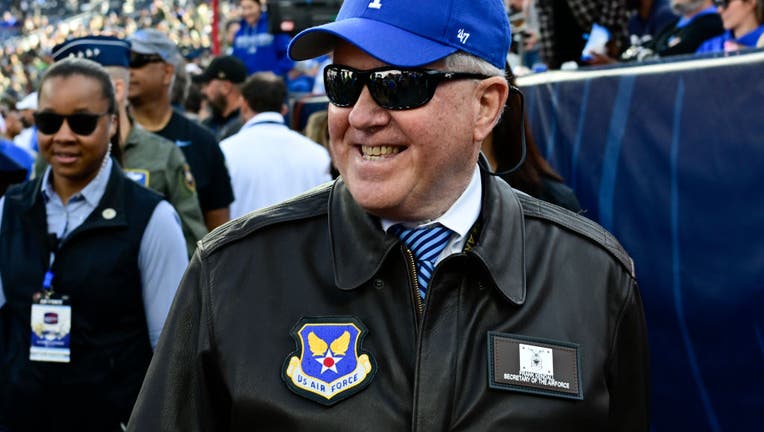Air Force secretary to fly aboard AI-operated fighter jet in test of future drone warfare

FILE - Secretary of the United States Air Force Frank Kendall at Empower Field at Mile High Stadium to watch the Air Force take on the Army West Point Black Knights November 04, 2023.
WASHINGTON - Air Force Secretary Frank Kendall is set to embark aboard an artificial intelligence-operated warplane, marking a strategic move by the service to highlight the future of air warfare. This demonstration highlights the initiative to introduce a fleet of over 1,000 autonomously operated combat aircraft.
Kendall shared during a Tuesday hearing with senators regarding the service's 2025 budget that he plans to personally experience the capabilities of one of the F-16s converted for drone flight. The Associated Press reported that Kendall aims to assess firsthand how the AI-controlled plane performs in flight.
"There will be a pilot with me who will just be watching, as I will be, as the autonomous technology works," Kendall told the Senate Appropriations Committee defense panel members. "Hopefully neither he or I will be needed to fly the airplane."
Unmanned 'wingman' aircraft, a new normal
The Air Force has long been strategizing its fleet of collaborative combat aircraft, known as CCAs, envisioning a scenario where a single piloted jet can effectively lead multiple AI-driven drones, referred to as "loyal wingmen."
Drone warfare has rapidly evolved from a peripheral aspect of combat to a central component. In regions like Ukraine and the Middle East, drones pose a daily threat.
In Ukraine, civilians face targeting by Russian drones, while also utilizing drones to gather intelligence on Russian positions. Similarly, in the Middle East, Iranian-backed groups regularly deploy sophisticated drones to target U.S. bases and commercial ships in the Red Sea, highlighting the expanding role of drones in modern warfare.
The Air Force requested $559 million in the 2025 budget to continue research and development of the future CCA air system.
Expert explains future of Artificial Intelligence
Vice President Kamala Harris spoke Wednesday at an Artificial Intelligence conference in London, addressing the Biden administration's plans to address concerns over A.I. Simon Wilby, the creator of 1Voice A.I. joined LiveNOW from FOX's Mike Pache to discuss the concerns and potential solutions.
The forthcoming test flight is not the inaugural unmanned jet operation with the broader objective of integrating pilots alongside AI-managed wingmen.
Last year, the Air Force Research Laboratory (AFRL) disclosed that an XQ-58A Valkyrie conducted a three-hour sortie under the guidance of AI and machine-learning systems developed by the lab. Although some specifics were withheld, AFRL stated that the aircraft showcased its capability to process mission-critical information, thereby advancing the Air Force's agenda to broaden the deployment of autonomous aircraft.
"The mission proved out a multi-layer safety framework on an AI/ML-flown uncrewed aircraft and demonstrated an AI/ML agent solving a tactically relevant ‘challenge problem’ during airborne operations," said Col. Tucker Hamilton, the Air Force’s AI test and operations chief.
The Associated Press contributed to this story. It was reported from Los Angeles.

